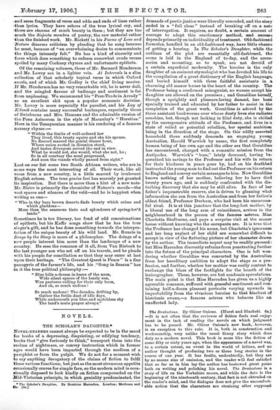NOVELS.
SCHOLAR'S DAUGHTER.*
NOVEL-READERS cannot always be expected to be in the mood for books of a depressing, disquieting, or edifying tendency, looks that "give furiously to think," transport them into the realms of nightmare, or convey instruction which in former ages would have been imparted through the medium of a pamphlet or from the pulpit. We do not for a moment wish to say anything derogatory of the claims of fiction to fulfil these various functions; but just as the most strenuous appetite occasionally craves for simple fare, so the modern mind is occa- nionally disposed to look kindly on fiction compounded on the Al-id-Victorian principle, in which geniality predominated, the • The Scholar's Daughter. By Beatrice Harraden. London: Methuen and Am Os.] demands of poetic justice were liberally conceded, and the steal, ended in a "full close" instead of breaking off on a note of interrogation. It requires, no doubt, a oertain amount of courage to adopt this reactionary method, mei meows depends primarily on individuality of treatment. Old-fashioned formulas, handled in an old-fashioned way, have little chance of getting a hearing. In The Scholar's Daughter, while the outlines of the plot are essentially old-fashioned, the scene is laid in the England of to-day, and the acces- sories and mounting, so to speak, are not devoid of a certain superficial modernity. The heroine is the only daughter of an eminent etymologist who has devoted his life to the compilation of a great dictionary of the English language, and buried himself with three faithful assistants in a charming old manor house in the heart of the country. The Professor being a confirmed misogynist, no women except his daughter are allowed on the premises ; and Geraldine herself, though a sprightly and pleasure-loving damsel, has been specially trained and educated by her father to assist in the completion of the great work. Geraldine is adored by the three assistant bookworms over whose dusty lives she radiates sunshine, but, though not lacking in filial duty, she is chilled by the unresponsive attitude of the Professor, and lives bra state of veiled or potential rebellion, her apeeial arabitien being in the direction of the stage. On this oddly assorted household there suddenly descends an engaging young Australian, Harold Warwick by name, the first -completely human being of her own age and the other sex that Geraldine has encountered, charged with a romantic mission from the Antipodes. Warwick's "boss," lately deceased, having be- queathed his savings to the Professor and his wife in return for their kindness in years gone by, had on his deathbed instructed the young man to find out the Professor on his return to England and convey certain messages to him. Now Geraldine knows nothing of her mother, believing her to have died twenty years ago, and is suddenly confronted with the dis- turbing discovery that she may be still alive. In face of her father's impenetrable reserve, she is driven to gleaning what information she can from the Australian and from her father's oldest friend, Professor Durham, who had been his unsuccess- ful rival. It is at this juncture that the long-lost mother, by a liberal use of the long arm of coincidence, arrives in the neighbourhood in the person of the famous actress, Mine Charlotta Shelburne, and pays a am-prise visit at the manor house without knowing who the occupants are. It is true that the Professor has changed his name, but Charlotta's ignoranee and her long neglect of her child are somewhat difficult to accept in view of the flattering picture of her character drawn by the author. The immediate sequel may be readily guessed ; but Miss Harraden discreetly refrains from penetrating further into the future of the principal characters. One is left won- dering whether Geraldine was converted by the Australian from her hereditary ambition to adopt the stage as a pro- fession, and further, whether her mother was really content to exchange the blaze of the footlights for the hearth of the lexicographer. These, however, are but academia speculations. The main point is that Miss Harraden has given us a highly agreeable romance, suffused with graceful sentiment and con- taining half-a-dozen pleasant portraits varying upwards in improbability from the vivacious heroine to that blackest of histrionic swans,—a famous actress who behaves like an unaffected lady.










































 Previous page
Previous page